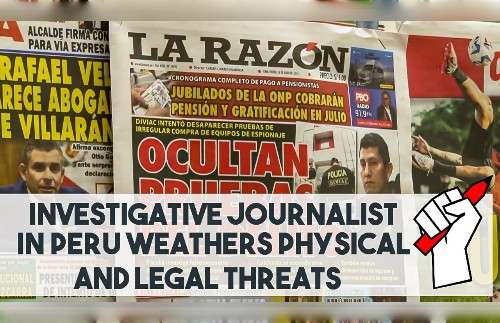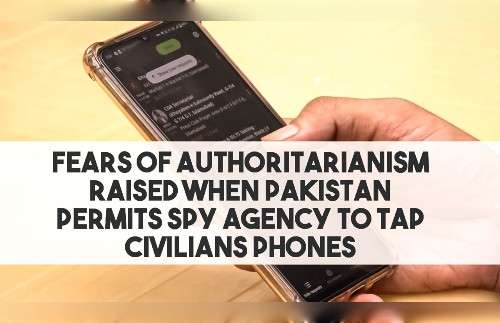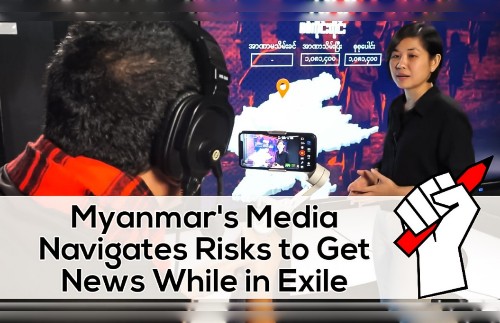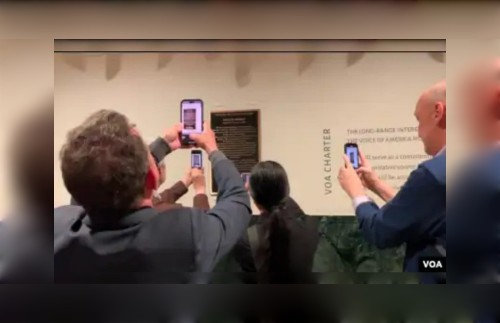Myanmar’s Supreme Court on Tuesday rejected an appeal by two Reuters reporters serving seven-year jail sentences for violating the country’s colonial-era Official Secrets Act to overturn their conviction, effectively exhausting the appeals process in a decision that will not bode well for other journalists in the developing democracy, one of their attorneys said.
Journalists Wa Lone, 33, and Kyaw Soe Oo, 29, were arrested in December 2017 while pursuing a story about the massacre of 10 Rohingya Muslims during a brutal military-led crackdown in western Myanmar’s Rakhine state. Authorities detained them shortly after two policemen with whom they had dinner in Yangon handed them state documents related to the atrocities, in what was widely viewed as a police setup.
The journalists, who were awarded a Pulitzer Prize last week for their Rohingya exposé, were sentenced in September 2018 after a lengthy series of hearings and a trial. They were not present at Tuesday’s hearing in Naypyidaw.

Attorney Khin Maung Zaw said he was disappointed with the decision by the nation’s highest court to uphold the journalists’ conviction and prison sentences, and that Supreme Court Justice Soe Naing did not offer any details about why the appeal was rejected.
“We are very disappointed with regard to the decision on the appeal,” he told reporters after the hearing. “This decision hurts not only the judicial independence of Myanmar, but also the pride of the nation.”
“Besides, it will affect all of you [journalists],” he said. “I think this case is a proof of a formidable hindrance of freedom of the press and freedom of information.”
A previous appeal that the journalists’ legal team filed with the Yangon Regional High Court was rejected in January.
In their appeal filing with the country’s Supreme Court on Feb. 1, the attorneys cited 13 grounds on which they believed judicial procedure had been violated in the handling of the case.
“The court has reaffirmed the verdicts of the two subordinate courts,” Khin Maung Zaw said. “In other words, they have to serve their remaining prison sentences. [The judges] only gave us the decision and not any reasons for the rejection of the appeal.”
The legal team will keep trying all possible approaches for the release of the two journalists, he added.
Although the decision by the top court effectively ends the legal appeals process for the reporters who already have served more than 16 months in Yangon’s Insein Prison, their relatives plan to ask President Win Myint to pardon them, defense attorney Than Zaw Aung said.
Pan Ei Mon, the wife of Wa Lone, who attended the session with Chit Su Win, the wife of Kyaw Soe Oo, said they had hoped for a good outcome from the Supreme Court.
“I was expecting some changes and was hoping for the best, but I am very saddened because the decision today is not what I expected,” Pan Ei Mon said. “Our lawyer will decide what to do next. As a family member, I’ve got nothing but grief.”
Chit Su Win expressed regret over the decision.
“I am sorry that the appeal was rejected,” she said. “He [Kyaw Soe Oo] was really hopeful about the appeal, and now it didn’t come as we had expected. I’m very disheartened. ”
After the court announced its ruling, Reuters’ chief counsel Gail Rove said, “Wa Lone and Kyaw Soe Oo did not commit any crime, nor was there any proof that they did. Instead, they were victims of a police setup to silence their truthful reporting.”
“I saw this decision coming’
Several veteran journalists in Myanmar said the Supreme Court’s decision to reject the appeal shows the government’s ill intentions toward the press.
Htet Naing Zaw, a senior reporter at the online journal The Irrawaddy, said the ruling will be detrimental to press freedom in the country.
“I saw this decision coming,” he said. “We have seen many questionable decisions when it comes to the rule of law in this country, not to mention the prosecutor in this case is the military.”
“We know that the judge made a decision based on the evidence presented to him, but this decision will affect press freedom adversely,” he said.
Aye Aye Win, a former Associated Press correspondent in Myanmar, agreed, saying the ruling points to an unfavorable environment for Myanmar’s media.
“It has led to many questions with regard to press freedom in the country,” she said. “It shows how deeply a journalist can get in trouble just for writing the news. It has really scared all other journalists.”
She said that because the military was directly involved in the case, the role of the Myanmar Press Council (MPC), which mediates complaints against journalists and should be the first step for anyone filing a complaint about the media, was practically meaningless.
“It is no longer effective in protecting the lives of journalists,” Aye Aye Win said. “The government will use the MPC only when it is deemed capable. When it is not, it is useless. The environment is very discouraging.”
MPC secretary Kyaw Zwa Min said the body has informed the military that it should file complaints against journalists with the MPC first, in accordance with the country’s Media Law, rather than file lawsuits against them in court.
“We have said this repeatedly,” he said. “But now, despite the presence of the Media Law and the MPC, prosecutors are suing journalists under other existing laws. We are not happy about this.”
“With regard to the standards in defining this case as a violation of the Official State Secrets Act, it was up to the government, but as for the rights of journalists, we were really hopeful that the two reporters would be released,” he added.
Kyaw Min Swe, a consultant for the Myanmar journal The Voice, said the ruling National League for Democracy (NLD) government’s response to the appeal indicated a return to the old approaches used by military dictators of the past who did not permit a free press.
“The NLD is now undeniably a part of the decision against the journalists,” he said. “It should try to recover from its loss of pride and negative perceptions. In the eyes of the international community, the NLD is now working hand-in-hand with the military in prosecuting journalists.”
He suggested that the NLD instead should grant amnesty to Wa Lone and Kyaw Soe Oo and take credit for it before the military takes any further action.
“The two Reuters reporters have been punished enough already,” Kyaw Min Swe said. “They don’t deserve the full prison sentences they received. We all know that they were not selling state secrets.”
On April 17, President Win Myint pardoned about 9,500 criminals during a traditional amnesty marking the Buddhist New Year, but only two political prisoners were among them, according to the domestic rights group the Assistance Association for Political Prisoners.
‘Deeply disappointing’
The U.S. government, the United Nations, and rights groups that have been closely following the case said they were disappointed by the court’s decision and lamented its effect on what they see as deteriorating freedom of speech and freedom of the press in Myanmar.
“The Supreme Court’s ruling in Wa Lone and Kyaw Soe Oo’s case is deeply disappointing,” tweeted the U.S. embassy in Yangon.
The convictions, like other charges that officials have brought against journalists, filmmakers, and performance artists, “point to an increasing intolerance for free speech in Myanmar,” its statement said.
“Journalism, satire, peaceful protest, and other forms of legitimate expression should not be crimes in a democratic society,” it said.
Knut Ostby, the U.N. chief in Myanmar, said, “The United Nations will continue to call for full respect of freedom of the press and human rights.”
“Wa Lone and Kyaw Soe Oo should be allowed to return to their families and continue their work as journalists,” he said.
Phil Robertson, deputy Asia director for New York-based Human Rights Watch, said Wa Lone and Kyaw Soe Oo should have never been arrested and prosecuted for doing their jobs as investigative journalists.
“That they are still in prison shows just how wrong Myanmar’s democracy under [leader] Aung San Suu Kyi is going,” he said in a statement.
“Sadly, when it comes to media freedom, both Myanmar’s military and the civilian government seem equally determined to extinguish any ability to question their misrule and rights violations,” he said. “These two journalists are just the most prominent victims of this pernicious campaign against freedom of expression that is rapidly spreading in all parts of the country.”
Nicholas Bequelin, regional director for East and Southeast Asia at London-based Amnesty International, said the ruling has dealt another blow to press freedom in Myanmar.
“The Supreme Court’s rejection of Wa Lone and Kyaw Soe Oo’s appeal compounds a grave injustice and marks a dark day for press freedom in Myanmar,” he said in a statement. “This case shows the authorities’ resolve to ensure there can be no independent reporting on the military’s atrocities in Rakhine State — even at the cost of debasing the country’s judicial system.”
Press freedom advocates have blasted the Myanmar government and its powerful military for using repressive and vaguely worded laws to silence their critics and for failing to repeal or amend statutes deemed incompatible with international human rights laws and standards.
Journalists and others have fallen victim to politically motivated arrests in Myanmar in recent weeks.
Five young people from a satirical performance group who were arrested in mid-April for allegedly mocking the government military are facing defamation charges.
Authorities have opened an online defamation case against Irrawaddy editor Ye Ni over an article the military said was “one-sided.”
And prominent filmmaker Min Htin Ko Ko Gyi was detained on April 12 for Facebook posts seen as critical of the military and Myanmar’s constitution, which was drafted by a former military junta that ruled the country.
Reported by Win Ko Ko Latt and Kyaw Thu for RFA’s Myanmar Service. Translated by Ye Kaung Myint Maung. Written in English by Roseanne Gerin.
Copyright © 1998-2016, RFA. Used with the permission of Radio Free Asia, 2025 M St. NW, Suite 300, Washington DC 20036
















